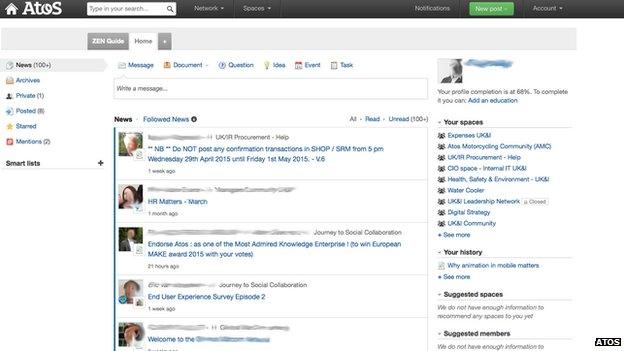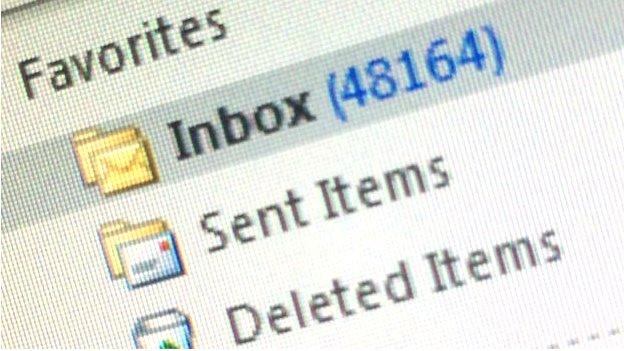'Email epidemic' is damaging UK productivity, says expert
- Published

The adoption of smartphones and tablets has made it easier for workers to stay connected to work email
Employers must tackle an "epidemic" of staff checking work emails after-hours, a former government adviser has said.
Sir Cary Cooper said a compulsion to deal with the messages had caused the UK's employees to become less productive than many of their international counterparts.
"For people to be working at night, weekends and holiday on emails is not good for the health of our country," the professor told the BBC.
He also wants limits on internal email.
"We need to ban emails [sent and received] within the same building," he said, advocating instead for face-to-face meetings and phone calls.
His comments follow a speech he gave on the topic to the British Psychological Society's annual conference, which was covered by the Times, external.
However, the academic sought to clarify the newspaper's claim that he wanted IT staff to shut down employers' computer servers outside office hours.
"I'm not encouraging them to do that - I think it's pretty extreme to close down your server," he said.
"But if it turns out [email] is adversely affecting your business and the health of your employees, then that's an option."

Sir Cary Cooper plans further research into the relationship between email use and work performance
A more practical solution, he said, would be to flash warnings if workers were detected to be using work email when they should be relaxing or engaged in family activities.
"They could get a message back, for example, saying, 'You have accessed 27 messages today,' alerting them to what they are doing.
"Every organisation has to come to a conclusion as to what is a good way to be operating, and the best way to do that is by asking the employees themselves how do we stop this epidemic of us being linked all the time to our emails."
Low productivity
Sir Cary is professor of organisational psychology and health at Lancaster University and previously advised the Government Office for Science about mental health in the workplace.
He referenced recent figures from the Office for National Statistics, external that indicate the UK has the second-lowest rate of productivity out of the leading G7 industrial nations - putting it behind the US, Germany, France, Italy and Canada, but ahead of Japan.
The professor acknowledged that email use was not the only factor involved, but suggested that the UK's development of a "macho culture", in which employees wanted to be seen to be available by email at all hours, was causing stress and depression, and in turn making workers less efficient.

Sir Carey believes brief face-to-face chats are a better way of communicating than via email
While some organisations have adopted work-focused social networks as an alternative to email - using products such as Microsoft's Yammer, Slack and Jive - Sir Cary said these were "symptoms of the same problem".
Internal email ban
IT services giant Atos, however, believes that social media tools can solve many of email's problems if used properly,
The French company made headlines in 2011 when it revealed it was banning the use of internal emails, external as part of a longer-term goal of ending email use altogether.
The announcement caused a stir in large part because much of the company's revenue is derived from providing email services to others.
Atos's chief information officer confirmed it had stuck with the policy, but added that this had required both training and a cultural shift.

Atos allows its own staff to send each other messages but not emails
"It's about making clear our expectations about communications have changed," Marc Mosthav told the BBC.
"In the past, the idea was that when you came back from holiday and had tens or hundreds of messages that you would deal with them.
"Now, we make clear that you don't have to catch up with them because social communication's needs are very different to those of an email application.
"And the whole practice of copying in everyone into a message in order to cover your own back has also been reduced - it really changes the way people think about work communications."
Mr Mosthav acknowledged, however, that few of Atos's clients had opted to adopt a similar "zero email" policy, at least as yet.
- Published1 April 2015

- Published19 February 2015
- Published8 December 2014

- Published8 March 2012
